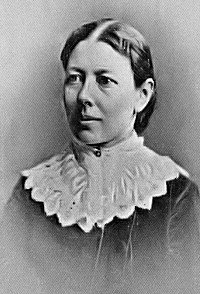Introduction

Words: Mary L. Demarest, 1861.
Music: Ione T. Hanna, 1864. Harmony by Hubert P. Main (🔊 pdf nwc).

There remaineth…a rest to the people of God.
Hebrews 4:9

Words: Mary L. Demarest, 1861.
Music: Ione T. Hanna, 1864. Harmony by Hubert P. Main (🔊 pdf nwc).

Many years ago John Macduff and his young bride left Scotland on a sailing vessel for America, there to seek their fortune.
After tarrying a few weeks in New York they went on West, where they were successful in accumulating a good competence. By and by the wife’s health began to fail. The anxious husband said that he feared she was homesick.
John,she replied,I am wearying for my ain countrie; will you not take me to the sea, that I may see the ships sailing to the homeland once more?Her husband’s heart was moved with compassion. In a few weeks he sold their Western home and took his wife East to a pleasant little cottage by the sea, whose further shore broke on the rocks that line the coast of Scotland.
She would often sit and gaze wistfully at the ships sailing from the bay, one after another disappearing below the horizon on their way to her ain countrie. Although she uttered no complaint, it was evident that she was slowly pining away. John was afraid that she would die in a foreign land; and as an effort to save her he sold his New England home, and took her back across the ocean.
She was speedily recovered by the keen mountain air, the sight of purple heather, nodding bluebells, and hedgerows white with fragrant hawthorn blossoms in bonnie Scotland, her own dear native land. To her it was home. And there is no sweeter word in any language than home!
…
At an early age [Mary Demarest] lost her mother and was left in charge of a Scottish nurse, from whom she learned something of the Scottish dialect. And her grandfather, a native of Scotland, had often sung little Mary to sleep with Scottish lullabies…At the age of 23, Mary Lee wrote this immortal poem, after hearing the story of John Macduff and his wife, and published it first in The New York Observer.
Sankey, pp. 193–95
I am far frae my hame,
An’ I’m weary aftenwhiles,
For the langed for hame bringin’,
An’ my Father’s welcome smiles;
An’ I’ll ne’er be fu’ content,
Until mine een do see
The gowden gates o’ Heav’n
An’ my ain countrie.
Refrain
The earth is fleck’d wi’ flowers,
Mony tinted, fresh an’ gay
The birdies warble blithely,
For my Father made them sae:
But these sights an’ these soun’s
Will as naething be to me,
When I hear the angels singin’
In my ain countrie.
I’ve His gude word o’ promise
That some gladsome day, the King
To His ain royal palace
His banished hame will bring;
Wi’een an’ wi’ hert
Rinnin’ owre, we shall see
The King in His beauty,
In oor ain countrie.
Refrain
Sae little noo I ken,
O’ yon blessèd, bonnie place
I only ken it’s Hame,
Whaur we shall see His face,
It wad surely be eneuch
For ever mair to be
In the glory o’ His presence,
In oor ain countrie.
Refrain
He is faithfu’ that hath promised,
An He’ll surely come again,
He’ll keep His tryst wi’ me,
At what oor I dinnna ken;
But He bids me still to wait,
An’ ready aye to be,
To gang at ony moment
To my ain countrie.